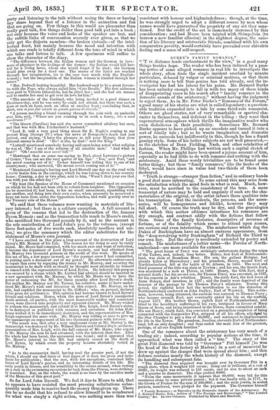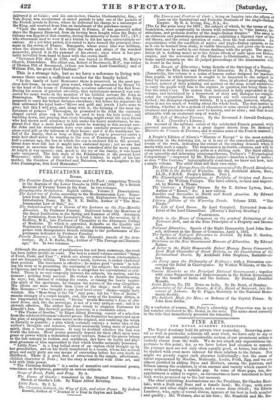BURKE'S FAMILY ROMANCE. *
"'T Is distance lends enchantment to the view," in a good many things besides hope. The reader who has been induced by a pass- ing notice of some alleged romance in real life to investigate the whole story, often finds the single incident overlaid by minute particulars, debased by vulgar or criminal motives, or that there is nothing more to tell than genius has told already, and the in- vestigator has had his labour for his pains. Mr. Bernard Burke has been unlucky enough to fall in with too many of these kinds of disappointing eases in his search after "family romance in the domestic annals of the aristocracy," without having the judgment to reject them. As in Mr. Peter Burke's "Romance of the Forum," a good many of his stories are what is called legendary ; a question- able tradition expanded into a tale by some third-rate romancist. Others are ghost stories, not of very remarkable or spectral cha- racter in themselves, and deficient in the telling : they want that supernatural atmosphere which thrills the imaginative reader who even disbelieves in their possibility. Sometimes Mr. Bernard Burke appears to have picked up an anecdote and turned it into a sort of family tale ; but as he wants imagination and dramatic power, he succeeds but indifferently in this, though he has a fluent gossipy style. Some of his better subjects are not well presented,— as the sketches of Bean Fielding, lgash, and other celebrities of fashion. When Mr. Phillips had written such a capital sketch of Curran, the reader might have been spared a jejune account of him, especially as he had little to do with romance and nothing with the aristocracy. Amid these wordy trivialities are to be found some better things ; but these "family romances," like the books of the Sibyl, would have risen in value had two-thirds of them been, destroyed. "Truth is strange—stranger than fiction," and in ordinary hands a good deal more interesting. To some extent this may arise from the satisfaction which the mind feels in what is real. Much, how- ever, must be ascribed to the consistency of the trim. A mere transcript of nature may be bald and ungainly if such are the cha- racteristics of the original, or the artist infuses those qualities into his transcription. But the incidents, the persons, and. the acces- sories, will be homogeneous and lifelike, however they may fall short. Of course the truth may be dry, and the genealogies with which this author ofttimes introduces his romances are dry enough, and contrast oddly with the fictions that follow them. Some of the family histories, descriptive of reverses of fortune, or of the fatality which seems to attend upon names, are curious and even interesting. The misfortunes which dog the Dukes of Buokingham have an almost ominous appearance, from the "deep-revolving witty Buckingham" of Richard the Third to our own day. But the story is needlessly extended by poetry and remark. The misfortunes of a loftier name—the Percies of North- umberland—are more available for extract.
"The great house of Percy was strikingly unfortunate during the reign of the Tudors, and, indeed, long before. Henry, first Earl of Northumber- land, was slain at Bramham Moor. His son, the gallant Hotspur, had already fallen at Shrewsbury ; and his grandson, Henry, second Earl of Northumberland, fell at the battle of St. Albans, in 1455. The next and third possessor of the title was slain at Towton ; and his son, the fourth Earl, was murdered by a mob at Thirsk, in 1480. Henry, the fifth Earl, died a natural death ; but his second son, Sir Thomas Percy, was executed, in 1537, for his concern in .Ask's rebellion. Henry, the sixth Earl, the first lover of Anna Boleyn, died issueless, in 1537; and the family were deprived of the honours of the peerage by Sir Thomas Perey's attainder. During this period, the rightful heirs had the mortification to see the dukedom of Northumberland conferred on John Dudley, Earl of Warwick. This noble- man, however, being attainted, the earldom was restored to Thomas Percy ;
who became seventh Earl, and eventually ended his life on the i scaffold, August 1572. H brother Henry, eighth Earl of Northumberland, still blind to the hereditary sufferings of his race, intrigued in favour of Mary Queen of Scots, and being imprisoned in the Tower, there committed suicide. His son Henry, ninth Earl, was convicted on a groundless suspicion of being connected with the Gunpowder Plot, stripped of all his offices, adjudged by the Star Chamber to pay a fine of 30,0001., and sentenced to imprisonment for life in the Tower. His grandson, beeline, eleventh Earl of Northumber- land, left an only daughter ; and thus ended the male line of the greatest, perhaps, of all our English families."
One of the romances about the aristocracy has very much of a trading air ; indeed, according to popular notions at the time, it approached what was then called a "bite." The story of the great Pitt diamond was told by " Governor " Pitt himself [he was the head of the then factory at Madras] in a sort of memorial he drew up against the charges that were spread about him ; and this defence contains nearly the whole history of the diamond, except its handling and subsequent fate. "The diamond thus acquired was brought over by Governor Pitt in a rough state, when it weighed 410 carats; being out in brilliant, at a cost of 5000L, its weight was redue,ed to 135 carats, and its size to about an inch and a quarter in diameter. The clips yielded 80001.
"From the same memoranda it appears that 80,0001. were f?fd for this enormous stone by some private person ; but it was finally sold, in 1717, to the Crown of France for the sum of 200,0001.; and the state jewels, in sealed packets, numbered, were pledged for the payment. The Governor himself • Family Romance ; or Episodes in the Domestic Annals of the Aristocracy. By J. Bernard Burke, Esq., Author of "The Peerage and Baronetage," The Landed Gentry," Ike. In two volumes. Published by Hurst and Blackett.
delivered it at Calais; and his son-in-law, Charles Choluiondeley, Esq., of Vale Royal, was accustomed at stated periods to take one of the packets of the French jewels to Dover, where he delivered his charge to a messenger of the Xing, and received from him an instalment of the purchase-money. "Upon the transfer of the diamond to France, it was generally called there the Regency Diamond, from its having been bought when the Duke of Orleans was Regent of that country, during the minority of Louis XIV., [XV.] who afterwards used to wear it as a button to his hat upon extraordinary oc- casions. At a yet later period, it is stated to have formed the principal orna- ment in the crown of France. Bonaparte, whose every idea was military, when the diamond fell to him with the wefts and strays of the wrecked monarchy, placed it in the pummel of his sword ; since when it has pro- bably travelled from hand to hand with the crown itself.
"Governor Pitt died in 1726, and was buried in Blandford, St. Mary's Church, Dorsetshire. His eldest son, Robert of Boconnock, M.P., was father of Thomas Pitt of Boconnock, (whose son became Lord Camelford,) and of William Pitt, the great Earl Chatham."
This is a strange tale, but as we have a reference to living wit- nesses there seems a sufficient voucher for the family belief.
"In the family of Lord Muncaster there is preserved, as the most pre- cious heir-loom, an ancient glass vessel, which was presented by Henry VI. to the head of the house of Pennington, a zealous adherent of the Red Rose. During his mason of greatest adversity, that unfortunate monarch was con- cealed for many weeks in the mansion of his faithful servant Sir John de Pennington. When concealment there was no longer practicable, the King prepared to carry his broken fortunes elsewhere; but before his departure he thus addressed his loyal host—' Silver and gold and jewels I have none to give; but this I will give, and, along with it, the blessing of the most un- fortunate of princes." Thereupon, he presented to Sir John the curiously shaped carved glass cup in which he used to keep his holy water ; and kneeling down, and praying that every blessing might await the loyal friend who had shown such constancy to him under his heavy misfortunes, he im- plored God that a male heir might never be wanting to this ancient race. Sir John and his descendants have ever since carefully preserved the pre- cious royal gift as the talisman of their house; and it is the traditional be- lief of the family, that as long as Xing Henry's cup is preserved entire a male heir shall never be wanting to the race of Pennington. Upwards of half a century ago, the box in which the cup is enclosed fell to the ground. Great fears were felt lest it might have sustained injury ; yet no one had courage to ascertain the fact, and the box remained shut for many years. At length it was opened; and, much to the joy of the family, it was found quite uninjured. The heir male of the Penningtons is the present Lord Muncaster ; while the heir of line is Lord Lindsay, in right of his late mother, the Countess of Crawford and Balearres, who was daughter to Sir John Bennington, first Lord Mimeaster."



























 Previous page
Previous page